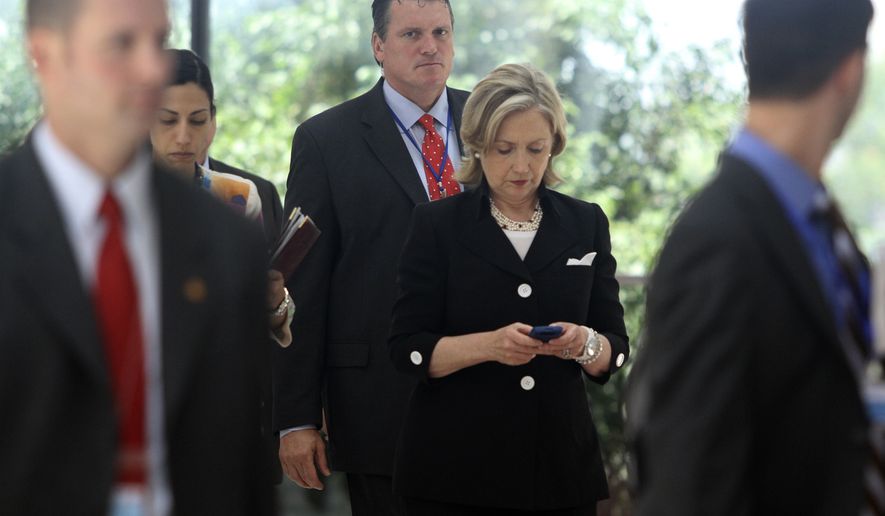Former Secretary of State Hillary Rodham Clinton received monthly missives about the growing unrest in Libya from a longtime friend who was previously barred by the White House from working for her as a government employee, according to emails received on her personal account.
The messages show the role played by Sidney Blumenthal, who was working for the Clinton family foundation and advising a group of entrepreneurs trying to win business from the Libyan transitional government. Mr. Blumenthal repeatedly wrote dispatches about the events in Libya to Mrs. Clinton, who often forwarded them to her aides at the State Department.
Mrs. Clinton’s earlier efforts to hire Mr. Blumenthal, who has spent nearly two decades working for the Clinton family, as a State Department employee were rejected by Obama administration officials who said they feared his role spreading harsh attacks against Mr. Obama in the 2008 presidential primaries would cause discomfort among members of their new White House team.
Mrs. Clinton is the leading candidate for the Democratic nomination for president, which has heightened the scrutiny of her use of a private email account and server while serving as secretary of state.
Mr. Blumenthal’s continued role was revealed in nearly 350 pages of emails, published Thursday by The New York Times, about the 2012 attacks on the U.S. diplomatic post in Benghazi, Libya, that killed four Americans, including U.S. Ambassador J. Christopher Stevens.
Last year, Mrs. Clinton gave the State Department 55,000 pages of emails that she said pertained to her work as secretary sent from the personal address she used while at the agency. The messages about the events in Libya were given for review to a special House panel investigating the attacks. They are expected to be released by the State Department in the coming days after months of delay.
The panel, which was initially formed to investigate Stevens’ death, has become a vehicle to question Mrs. Clinton’s tenure at the State Department. This week, the panel subpoenaed Mr. Blumenthal to testify on Capitol Hill.
There is nothing in this batch of emails to suggest that Mrs. Clinton was actively soliciting Mr. Blumenthal’s advice or alleged intelligence information, although the documents contain few replies she may have sent to him. Her responses are polite, in one case thanking him for “useful” information.
Much of the contents deal with infighting that still plagues Libya, as weak political leaders failed to disarm powerful revolutionary militias and different armed commanders battled among themselves for the nation’s spoils.
The evening after the Benghazi attack, Mr. Blumenthal forwarded to Mrs. Clinton an analysis of the situation from former CIA official Tyler Drumheller, which purported to contain information from “sources with direct access to the Libyan National Transitional Council as well as the highest levels of European governments as well as Western intelligence and security services.”
The memo said a top Libyan official, Mohamed Yousef el-Magariaf, had told close associates that the Benghazi attack was carried out by the militant group Ansar al-Shariah and that Libyan security officials believed the group “took advantage of cover provided by” demonstrations against the Internet video seen as insulting to the Prophet Muhammad to conduct it.
The memo, citing an unidentified source passing on information from unnamed Libyan security officials, said that 21 members of Ansar al-Shariah had joined with about 2,000 demonstrators outside the Benghazi facility. Citing the same source, the memo said that some Libyan officials believed the protest was organized solely as cover for the attack.
The unidentified source cited by Mr. Drumheller said some Libyan security officials had told Mr. el-Magariaf that the group had been planning the attack for about a month.
Mrs. Clinton forwarded Mr. Blumenthal’s email to her deputy chief of staff, Jake Sullivan, with the instruction, “We should get around [to] this asap,” to which Mr. Sullivan replied, “Will do.” Mrs. Clinton also forwarded the email to another person, whose identity is redacted, with the instruction “pls print.”
Other emails to Mrs. Clinton from Mr. Blumenthal in the aftermath of the attack offer additional material from similar unnamed sources describing Egyptian and Libyan governments’ concerns about the situation and growing sectarian violence. They also contained rumor and speculation about various internal Libyan government deliberations.
In January 2012, eight months before the Sept. 11 attack on the U.S. outpost, he tells Mrs. Clinton how 2,000 disgruntled veterans, supported by students, attacked the Benghazi headquarters of Libya’s struggling, post-Gadhafi government. They threw Molotov cocktails and beat government employees, he claimed, and destroyed equipment and files.
Some of Mr. Blumenthal’s analysis was questioned by State Department officials and by even Mrs. Clinton. Gene Cretz, Stevens’ predecessor as U.S. ambassador to Libya, described one note as “odd,” and saying the author appeared to have confused two individuals with similar names.




Please read our comment policy before commenting.